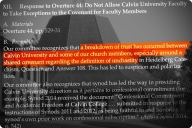You have /5 articles left.
Sign up for a free account or log in.
Many secular academics could never imagine working at a college with a "statement of faith" with which everyone must agree. What makes a controversy breaking out about Wheaton College in Illinois striking is that the criticism is coming from a church-going professor who has no problem with the concept of a statement of faith. And lest the criticism appear to be coming from an outsider, he wanted to make his points not in the secular press, but in Books & Culture, a highly respected publication that is something like a Christian New York Review of Books.
He almost pulled it off, and won the editor's backing for an ambitious look at the college. The piece was edited and the cover was designed and approved. But the article was killed at the last minute by the president of Christianity Today International, a ministry founded by Billy Graham that publishes Books & Culture and many other periodicals. According to the editor of Books & Culture, no article has been blocked in its 15-year history and he stands behind the killed piece. Harold B. Smith, the president of Christianity Today International, declined via e-mail to say why he killed the piece, but confirmed that it was his decision.
All of which has many people wondering why this article was killed, and whether its critique was on target. The author -- Andrew Chignell, a Wheaton alumnus who is associate professor of philosophy at Cornell University -- has just published the article online, along with "the back story" about how the piece was killed.
And so now those concerned about the future of Wheaton -- seen by many as a flagship of evangelical higher education and known for top-notch academic programs -- are debating both the article and what happened to it. The timing of the incident could be important as it comes as Wheaton's board is considering successors to Duane Litfin, who is finishing up a 17-year run as president and whose philosophy is very much in dispute in the article. Some observers believe the article was killed to avoid offending Litfin while others speculate that the article was killed to avoid boxing the board into a corner in which it would feel the need to appoint a successor with views identical to Litfin's. (Several people familiar with the issues declined to speak on the record, for fear of angering Wheaton, Christianity Today International or both.)
'The Preeminent Religious College'
The article opens by noting all that Wheaton has much "to celebrate" from the Litfin years in office, including increased admissions selectivity, new academic programs, strong finances, "many excellent hires of younger faculty," and "in marked contrast to many American colleges with religious roots, Wheaton has not strayed from the core commitments on which it was founded." But the article also notes concerns.
"[W]hen one spends time talking with Wheaton faculty, students, and supporters, alongside real appreciation one is also likely to hear expressions of deep concern about the unusually pro-active roles that Litfin and his provost, Stanton Jones, have assumed as the definers and defenders of orthodoxy across the college. On the eve of transition to new leadership, this concern needs to be aired -- not for the sake of settling scores, not in a spirit of smug judgment, but rather to provide one more important perspective as the college and its constituency look to the future.... The goal here is to view Wheaton the way it views itself: as the preeminent religious college in the country and the training ground for generations of Christian leaders."
Much of the article focuses on instances in which Litfin and Jones enforced the college's religious outlook. Wheaton is nondenominational, but has both a detailed statement of faith and a related "community covenant" that all at the college must follow.
Some of the incidents have been reported previously. For example, there is the case of a philosophy professor who was in otherwise great standing at the institution, but who was dismissed because he converted to Roman Catholicism. The fired professor, Joshua Hochschild, believed he could continue to sign and abide by the statement of faith, which doesn't bar anyone from being a Catholic. But Wheaton officials argued that his conversion to Catholicism (he had been Episcopalian) violated the college's belief that Scripture alone -- not Scripture as interpreted by the pope and the Vatican -- defines God's goals for humanity.
Other disputes reported by Chignell include debates over the teaching of evolution or disagreements over Wheaton teachings on sexuality. For example, he discusses a case of a recruit for a faculty job who lost her shot because, when signing her agreement with the statement of faith and community standards (which call for "chastity among the unmarried and the sanctity of marriage between a man and woman") she added a "clarification."
She stated: "It isn't clear to me that the Bible unambiguously condemns monogamous same-sex relationships." While she added that she wasn't endorsing such relationships or asserting that God did so, her statement that the issue wasn't unambiguous was enough to end her job candidacy, Chignell writes.
The article talks about a fear at Wheaton that even the slightest deviation from very detailed views would leave the college "on a slippery slope towards Oberlin," which is seen as the ultimate example of a college that strayed from its religious mission.
In an interview, Chignell said that he does not want for Wheaton to become secular. His father taught there for 25 years and he grew up "on the campus doorstep." He remains proud of the education he received there and close to the friends he made. But he said that he rejects the idea that the only choices for Wheaton are to stay exactly as it is or to become Oberlin.
Litfin, Wheaton's president, has spoken frequently of the difference between religious colleges that are "umbrella institutions" (where a sponsoring faith may be more visible, but other faiths are welcome to be visible as well) and "systemic institutions" like Wheaton, where a single faith is omnipresent in the entire institution. Chignell said he completely affirms the value of institutions like Wheaton. "I think systemic places are really important, and I don't think you can't have credal commitments on the part of faculty," he said.
But he said that "disagreements over what prepositions mean" in the statement of faith or "slightly different takes on what the virgin birth amounts to" are treated as major theological disagreements. "Anybody who has a slightly variant position is either fired or questioned," he said.
In this approach, Wheaton is "going far beyond what it needs to do" to preserve the faith of the college, and is limiting the rights of professors to explore ideas, he said.
Litfin, in an interview, said that it was frustrating to respond to the article. He said that he couldn't speak to any details about the cases discussed in the article without violating confidentiality rules, and he said that he feared having his views on Christian colleges -- which he has outlined in a book -- reduced "to sound bites."
But he did make several points. First, he rejected the idea that Wheaton has "seen some sort of tightening" on views under his leadership. "I do not represent a departure from anything that has gone before at Wheaton College. This is about Wheaton being the kind of institution that it is," he said.
Second, he said that statements of faith (at least at Wheaton) aren't meant as a starting point for debate. "The underlying issue here is that if you have a statement of faith, who determines what a statement of faith means?" To Litfin, the answer is the college.
"It is the institution's task to make clear what the statement is, to clarify it for anyone who needs clarification. That is the whole point of having a statement of faith," he said. The obligation of a college with a statement of faith is not to ask for everyone's opinion on it, but to be "clear and public and explicit about what it is."
Killing the Story
John Wilson, the editor of Books & Culture throughout its history, said he was as surprised as anyone that he was barred from publishing Chignell's article. Wilson, who was involved in editing the piece, said that while he didn't necessarily agree with all of the opinions in the piece, the story was "accurate" in all of its substance and he would stand behind it.
Early on in the reporting process, Wilson recalled, Chignell asked him if the direction of the piece would be problematic. "Perhaps it was naïveté on my part, but I didn't foresee that, or expect that," Wilson said. "Andrew asked me if this would be a problem and I waved that off."
While the publication treats issues of faith as central, it has never restricted itself to a single point of view, he said. "We publish so many articles with incompatible views," he said, that readers know that the editors aren't endorsing positions so much as providing a forum for a range of views.
Wilson declined to discuss any details of the order to kill Chignell's piece, but he said that Chignell's account was accurate and referred questions to Smith, the president of Christianity Today International, who declined comment.
Litfin, the Wheaton president, said that college officials "had zero contact" with Christianity Today International officials about the article. "Even if I had the ability to stifle the article, I would not have done so," he said. "It goes against the grain of everything I believe."
He added: "I disagree with the article, but I don't think the article is something we need protection from."








